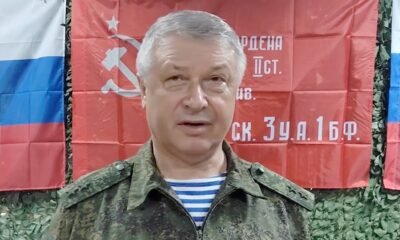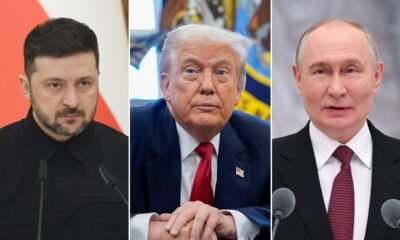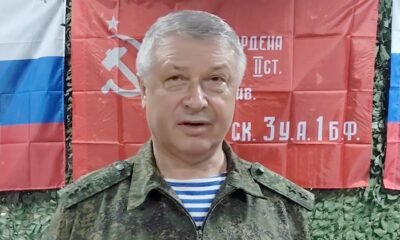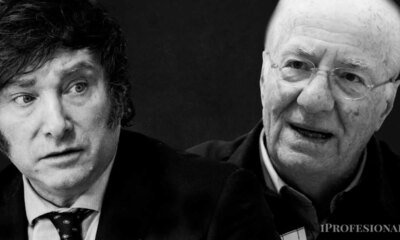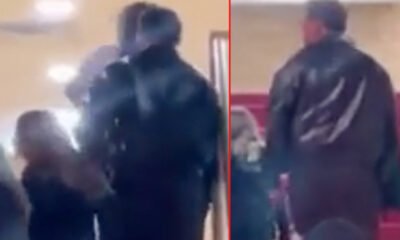INTERNACIONAL
Russian leader responds to American conservative’s murder: ‘A disgusting atrocity’
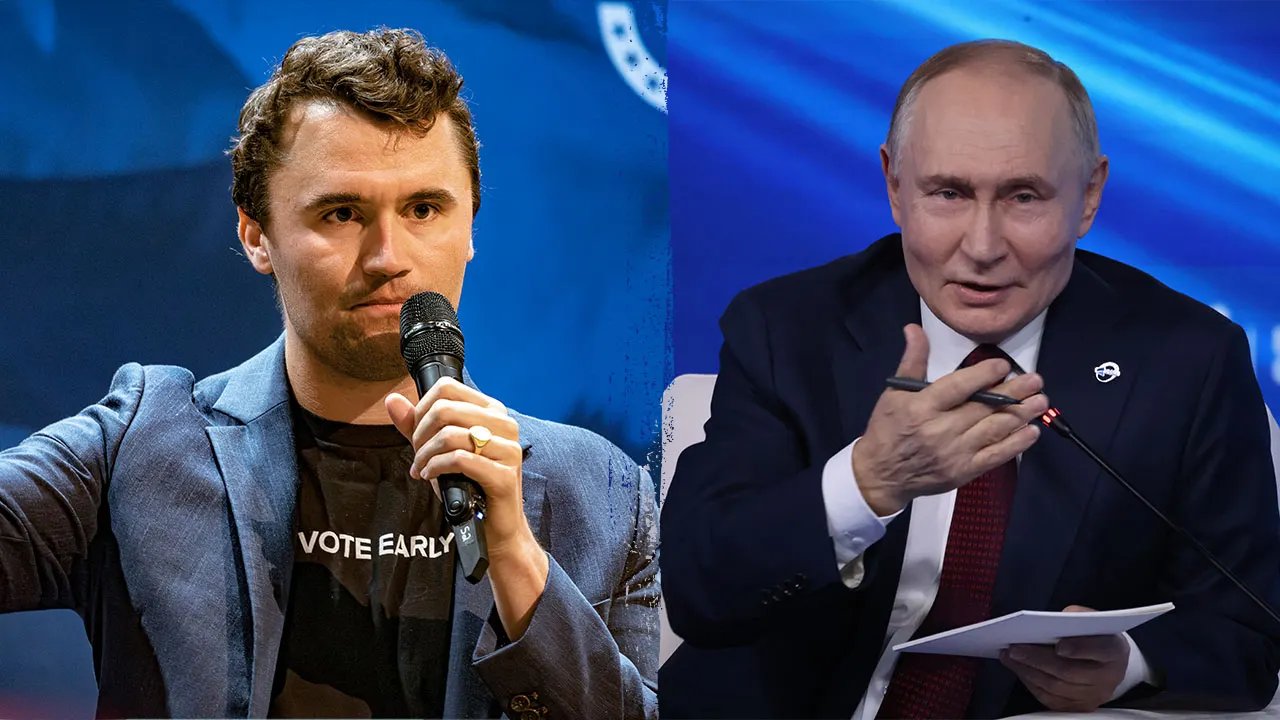
NEWYou can now listen to Fox News articles!
Russian President Vladimir Putin on Thursday said the assassination of Charlie Kirk was a sign of a «deep rift» in American society, while offering his condolences to the family of the late conservative activist.
Speaking at the Valdai Discussion Club in Sochi at a forum of Russian experts, Putin addressed the killing, according to Reuters.
«This is a disgusting atrocity, especially since it was broadcast live. We all saw it. It was truly horrific,» Putin said. «First and foremost, I extend my condolences to Mr. Kirk’s family and all his loved ones. We sympathize and empathize.
JD VANCE DECLARES THERE IS ‘NO UNITY’ WITH PEOPLE WHO CELEBRATE CHARLIE KIRK’S ASSASSINATION
Russian President Vladimir Putin on Thursday condemned the killing of Charlie Kirk while speaking to a panel of Russian experts. (Getty Images)
«What happened is a reflection of a deep division within society. In the United States, I don’t believe there is any need to escalate the situation externally, as the country’s political leadership is working to restore order domestically,» he added.
Kirk was shot and killed in September while speaking at Utah Valley University.
His alleged killer, Tyler Robinson, faces seven charges, including aggravated homicide, which carries the potential death penalty; felony discharge of a firearm; obstruction and witness tampering.
Robinson returned to court Monday and is scheduled to appear again Oct. 30. Prosecutors said they had already gathered «voluminous» evidence against him.
TRUMP DEFENDS LABELING ANTIFA A ‘TERRORIST ORGANIZATION’ AS HE TARGETS LEFT-WING EXTREMISM
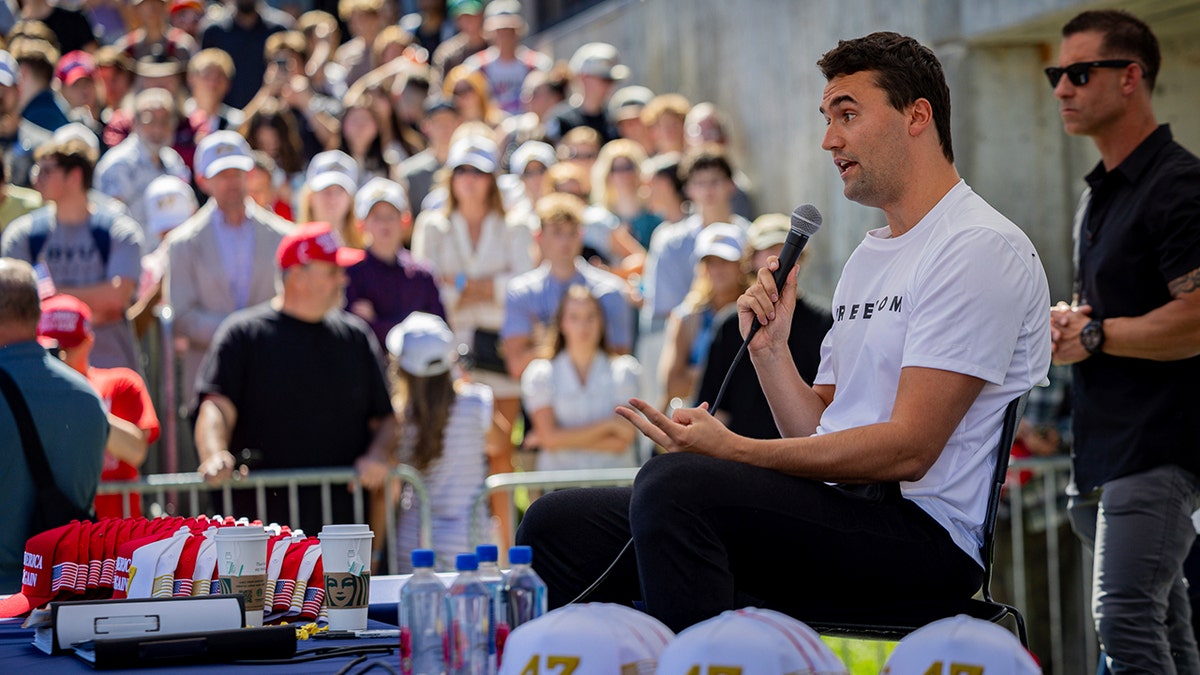
Charlie Kirk speaks before he is assassinated during Turning Point’s visit to Utah Valley University in Orem, Utah, Sept. 10, 2025. (Tess Crowley/The Deseret News via AP)
Kirk’s murder has intensified debate over political violence in the United States. Republican leaders have urged Democrats to moderate their rhetoric toward President Donald Trump and to embrace greater tolerance for opposing views.
In addition to addressing Kirk’s death, Putin responded to Trump’s recent characterization of Russia as a «paper tiger.»
«A paper tiger? Then go deal with this paper tiger,» Putin said. «If we are fighting the entire NATO bloc, moving forward, advancing and feeling confident, and we are still called a paper tiger, then what does that make NATO itself?»
CLICK HERE TO GET THE FOX NEWS APP
Last week, Trump predicted Ukraine could reclaim all its territory from Russia before labeling Moscow a «paper tiger.»
vladimir putin,charlie kirk,russia
INTERNACIONAL
¿Qué nombre le ponemos a la era histórica que estamos viviendo?

¿Cómo la llamaremos? En lo personal ya no tengo dudas de que está vinculada a la presencia o retorno de la geopolítica, nombre que, como tantas otras denominaciones, proviene del griego antiguo, combinando las palabras política y tierra. A pesar de carecer de una definición compartida por todos, se refiere a las relaciones de poder entre Estados, aplicándose también a las relaciones internacionales, y con indiferencia de la escala, se ocupa de las estrategias, preferentemente las que se relacionan con soberanía, territorios, intercambios económicos y posibles conflictos. En general, permite tomar decisiones utilizándose escenarios posibles para que la acción política pueda orientarse hacia futuros acontecimientos.
Sin duda vivimos una época de cambios, cambios profundos. “Ponerle un nombre nos aleja, tanto de la nostalgia por un pasado que desaparece como también de la Trumpmanía, es decir, la total dependencia ya sea de amor u odio a su persona, permitiéndonos abrir la mente a lo nuevo que se acerca y huir de la trampa de llamar a esta era post-algo, que en definitiva no explica nada y hasta confunde, ya que la realidad es siempre más fuerte, bastando al respecto recordar lo que ocurrió con el llamado postcomunismo al desaparecer la URSS con Rusia como sucesora legal.»
Creemos saber que en lo internacional estamos transitando por una etapa de desorden, no importando si es verdad o no, ya que así se percibe en forma generalizada y que las reglas del multilateralismo que predominaron por décadas están heridas de muerte, pero entonces ¿cómo llamar a la era que vivimos?
Creo que se ha impuesto la primacía de la geopolítica por sobre la economía, incluyendo la de mercado que predominó a partir de la caída del Muro de Berlín. “A pesar de que la nombra poco, con Trump, su importancia se ha hecho visible a nivel mundial, aunque ha guiado las decisiones de Putin desde que asumió el poder ruso hace ya más de un cuarto de siglo y China ha hecho lo mismo desde que Xi Jinping transformó una dictadura colectiva en una personal, la suya, tal como ha quedado evidenciado por la última purga de mandos militares. Pero, para efectos de imitación, no son EE. UU., al menos no todavía en el caso chino.»
Muchos analistas identifican lo que ocurre con la persona de Donald Trump, aunque es inexacto, ya que no fue su creación ni le puso un nombre, toda vez que los elementos del derrumbe de la era anterior ya venían desde antes, como la muy visible irrelevancia e ineficiencia de la ONU. Además, Trump se encontró con un movimiento político que ya existía, que le dio el respaldo suficiente al cambio en EE. UU. y otros países de occidente, aunque no hay duda de que Trump le proporcionó sentido y dirección, exportando el movimiento MAGA a otros lugares.
“Es un gran cambio, pero no sabemos si va a durar lo suficiente como para prolongarse después del término de su gobierno el 2028, toda vez que hay sentencias que están pendientes en la Corte Suprema para que se pronuncie si tiene atribuciones suficientes como para imponer aranceles como también iniciar o responder a conflictos, sin autorización previa del Congreso. Además, en un país polarizado, no existe consenso político interno, y tal como ocurriera después de su primer gobierno el 2020, una victoria demócrata podría dejar sin efecto decisiones importantes, ya que no son leyes, sino solo resoluciones ejecutivas.”
Sin embargo, aunque ello ocurriera, más aún, aunque la Casa Blanca fracase, el mundo ya no va a ser el mismo, no va a ser igual aun si tampoco tenemos claridad en torno a lo que viene después. Al respecto, mi estimación es que mucho se mantendrá, ya que hay dos certidumbres, grandes como el Everest, que no se van a modificar, siendo la primera, la confrontación que marca este siglo XXI, “la lucha por la primacía entre China y EE. UU.”, y en la segunda todo indica que perdurará la permanencia de la geopolítica.
A diferencia de la guerra fría donde predominaban criterios de lucha ideológica, por ejemplo, democracia versus comunismo, hoy no es una competencia total, sino que se acepta al capitalismo como el mejor asignador de recursos, pero a pesar de ello, existen visiones muy contrapuestas entre el capitalismo de libertad individual de EE. UU. con el capitalismo de Estado que predomina en China, con participación amplia del gobierno en la toma de decisiones.
A nivel internacional, en esta confrontación por el predominio global, las grandes potencias representan más que un país al ser expresión de verdaderas civilizaciones, la confuciana en el caso de China y occidente en el caso de EE. UU., con un desarrollo histórico que tiene la triple confluencia de los principios judeocristianos, el aporte grecorromano y el legado de la ilustración. Rusia pugna por ser considerado como gran poder, pero solo lo es a nivel militar, siendo poco importante a nivel tecnológico y económico, aunque representa una continuidad geográfica y territorial en Europa y Asia, presente desde el zarismo a Putin, siendo la URSS la forma que adquirió bajo el comunismo el imperio zarista. A nivel mucho menor, Turquía bajo Erdogan busca igualmente ser más de lo que es, al reivindicar en esta nueva era una especie de neo-otomanismo buscando recobrar la pasada influencia del imperio otomano del que es sucesor.
“El cambio global que vivimos no lo empezó Trump, quien sin embargo lo aceleró y expresión de ello ha sido Davos, cuyo Foro Económico Mundial es la principal reunión del llamado globalismo, donde ahora se le escuchó con respeto a diferencia de las sonrisas burlonas con las que fue recibido en su administración anterior, por lo que el 2026 fue la primera ocasión donde la geopolítica fue más importante que el mercado en su reunión anual, tal como quedó de manifiesto con la recepción al discurso del primer ministro canadiense Mark Carney, quien, siendo total crítico de Trump, fue aplaudido por sus argumentos geopolíticos, a pesar de su declarada admiración por la era histórica que nos abandona.»
Sin embargo, debemos enfatizar que la abundante nostalgia por la era que termina no siempre se justifica, ya que los indicadores de desgaste eran visibles para todos aquellos que quisieran verlos. Es así como el sistema establecido después de la segunda guerra mundial mostraba su deterioro por diferentes vías, partiendo por la pérdida de credibilidad estratégica de EE. UU. muy acentuada en la administración Biden, como también por el ascenso de China, reduciendo las distancias cada año, todos los años. En forma paralela, en varias democracias, se incrementaba la visibilidad de los perdedores de la globalización, incluyendo áreas y sectores de EE. UU.
Tal como ha ocurrido siempre, en esta nueva etapa también habrá perdedores y ganadores, tal como los hubo en cambios anteriores, grandes y chicos. “Se dificulta el aprovechamiento de oportunidades, cuando todo se centra en la persona de Donald Trump, necesitándose cabeza fría, y no actuar sobre la base de la emoción en vez de la razón.”
Problemático y lleno de obstáculos se aprecia el futuro de áreas geográficas como áfrica o Iberoamérica y el Caribe que parecen carecer de lo que se llama inteligencia estratégica en su proceso de toma de decisiones, incluyendo a mi natal Chile que, por situaciones relacionadas con una dictadura del pasado, en pleno siglo XXI todavía se carece de un servicio de inteligencia digno de ese nombre en materias estratégicas de Estado, que no sean las militares.
Como en todo cambio planetario, hay disgusto y molestia en quienes se sentían cómodos en el esquema que va desapareciendo, no solo en la política mundial, sino también en lo cotidiano o en lo laboral, dado el acelerado cambio en esas áreas. “Sin embargo, como enseñó Darwin en el Origen de las Especies, la supervivencia se relaciona con la capacidad para adaptarse y no con el poder o fuerza, tal como lo refleja la desaparición de los dinosaurios, cuyos equivalentes humanos parecen predominar hoy en Europa, continente que sufre una irrelevancia creciente a pesar de su magnífica importancia histórica y cultural.”
La única recomendación posible es salir de la dependencia en Trump como único factor explicativo, ya que perjudica no entender la profundidad de los cambios que están teniendo lugar, al criticarlo más por la estridencia y agresividad de algunas de sus opiniones que por los cambios que impulsa.
Es así como en el día de hoy, en Ucrania y el Medio Oriente no hay otras propuestas de paz que las suyas, sobre todo, en Gaza. EE. UU. ha vuelto a ser la potencia indispensable, siendo una dificultad la falta de buenas biografías o de estudios mínimamente objetivos sobre lo que está pasando, “influyendo también la incapacidad del gobierno de Trump para explicar lo que intenta hacer.”
Mi recomendación sería recurrir a lo poco que tenemos a mano, de partida, el libro El arte de la negociación escrito a cuatro manos con un periodista y, sobre todo, la muy importante “Estrategia 2025 de Seguridad Nacional” (y su subproducto para la Estrategia de Defensa), donde por vez primera se le aporta un contexto a lo que EE. UU. está haciendo. Considero que debieran ser de lectura obligatoria para todos quienes toman decisiones, no solo en el Medio Oriente o China, sino también a todo nivel, ya que en Chile fue notorio que Kast no tomó una buena decisión al nombrar futuros ministros de RR. EE. y Defensa, a dos personas de gran trayectoria, pero que parecían más adecuadas para el perfil promercado que predominó en los 90 que al actual, donde las decisiones de las grandes potencias están marcadas por la geopolítica.
En el mundo abunda la información, pero mucha gente sigue sin entender las grandes tendencias sobre las cuales se transita, ya que demasiada información se construye sobre la base de lo impactante más que de lo trascendente, además, que docentes y comunicadores no cumplen una buena labor pedagógica, toda vez que siguen utilizando categorías y esquemas de un mundo que va desapareciendo. De hecho, existen en los medios de comunicación, personas que presumen de estar bien informadas, pero en los hechos están desactualizadas por falta de comprensión de lo que ocurre, por lo cual no pueden explicar bien las nuevas realidades.
Por lo menos de aquí al 2028, o hasta que exista un consenso de política exterior en EE. UU., no tengo dudas de tres cosas, primero, predominan las decisiones geopolíticas, segundo, que lo que ocurre en lugares como el Medio Oriente o Ucrania coincide hoy con el hecho indiscutido, que el orden surgido después de 1945 se está desintegrando frente a nuestros ojos, y tercero, la existencia de un cambio de la magnitud de la IA o inteligencia artificial, todo tanto para el bien como para el mal, como también con un impacto que se sentirá arriba y abajo, tanto en aquellas potencias que logren conducir este proceso como también en aquellos países y regiones cuya marginalidad será creciente.
Por cierto, no es, al menos todavía, un cambio de la magnitud de lo que ocurrió al finalizar la Primera Guerra Mundial, que presenció nada menos que la desaparición de cuatro imperios, el ruso zarista, el austrohúngaro, el turco otomano y el del Kaiser alemán. Algo similar tuvo lugar después de la Segunda Gran Guerra cuando dos países, y solo dos, surgieron como superpotencias, la URSS y EE. UU., además que dos grandes imperios coloniales como Francia y el Reino Unido, desde entonces pasaron a ser potencias medianas, cuya declinación sigue prolongándose.
“Lo que hoy ocurre no es a ese nivel, al menos no todavía, pero es de hecho comparable con el cambio que transcurre entre la caída del Muro de Berlín (9-XI-1989) y la disolución de la URSS (26-XII-1991). Me atrevería a decir que lo de ahora es aún más importante, ya que por espectacular que haya sido en lo político el fin del comunismo, los fundamentos del orden económico no fueron entonces cuestionados, sino que países de Europa del Este y algunos que habían sido parte del imperio soviético terminaron integrándose a la Unión Europea y a la OTAN.”
Es indudable, que, sobre todo, en esta segunda presidencia, con un Trump recargado, que vino preparado para acelerar sus propuestas, en solo un año se ha materializado un cambio de paradigma, primero a nivel nacional y después en el mundo, con una profundidad que no había ocurrido ni siquiera en su primera presidencia. Es decir, “instituciones y reglas que fueron creadas por EE. UU. hoy están siendo modificadas por ese mismo país”. A lo anterior, hay que sumar acuerdos a los que llegaron los vencedores en Yalta, y que fueron impuestos o seguidos por el resto del mundo. La imposición tuvo lugar, a no olvidarlo, también por la fuerza, aunque no fuera lo medular, a modo de ejemplo, Irán 1953, Guatemala 1954, Hungría 1956, Checoslovaquia 1968, como también la primera (1991) y segunda guerra del Golfo (2003), después que EE. UU. adquiriera el sitial de única superpotencia.
Este cambio fue motivado por algo que precede a Trump, quien, sin embargo, lo transforma en decisión política al más alto nivel, cual lo es la convicción de que para confrontar el ascenso de China se necesitaban profundas adecuaciones internas e internacionales, tanto en lo económico como en lo político, es decir, geopolítica pura, bastando ver como los aranceles son usados para premiar o castigar, es decir decisiones sin relación con lo económico. En todo caso, en lo económico, los aranceles son un instrumento que busca modificar las reglas multilaterales a través de decisiones y/o negociaciones donde predomine el peso de EE. UU. En el nivel político, somos testigos de una modificación profunda de la alianza atlántica como también del orden multilateral, siendo la novedad, que no solo se arremete contra adversarios sino también se hace contra vecinos y amigos.
El poder adquirido por China se manifiesta en que para efectos de la negociación de aranceles EE. UU. le reconoce como un igual, lo que no hace con ningún otro país, desde el momento que Japón y la Unión Europea aceptan las nuevas condiciones con rapidez. A diferencia de ellos, China le embarga a Washington las llamadas tierras raras, es decir, minerales básicos para las nuevas tecnologías y la industria avanzada de Defensa. Beijing pudo hacerlo porque en las décadas precedentes, EE. UU. se descuidó, lo que permitió que Beijing gozara de un cuasi monopolio, regulando su uso por criterios geopolíticos más que de mercado. De tener éxito esta negociación entre China y EE. UU., el poder combinado de ambas economías es tal, que el resto del mundo va a tener que adaptarse, quiéralo o no, con lo que, en la práctica, y sin mediar un Tratado general, van a ser de hecho, las nuevas reglas del comercio internacional, en reemplazo de las que están en desuso.
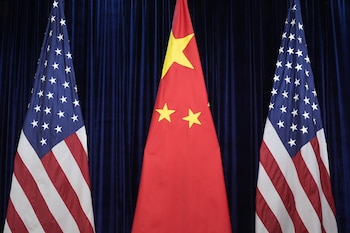
Esta negociación entre China y EE. UU., la primera de igual a igual, marca una diferencia con el periodo de predominio de Washington posterior al fin de la URSS. Sin embargo, no es lo único, ya que del mismo modo Groenlandia también marca una diferencia, ya que, aludiendo a criterios geopolíticos, se rechaza una soberanía danesa que provenía de la época colonial, al haber sido incorporada esa isla gigantesca a ese reino por el simple expediente de haber llegado a esas latitudes, tal como era habitual para los europeos en los siglos XVIII y XIX, lo cual tampoco debiera ser motivo de orgullo.
En esta nueva realidad, el éxito de EE. UU. está limitado por un escollo grande, cual lo es su política interna, toda vez que existe tal polarización y división, que nada asegura que el país pueda mantener su curso de navegación si es que cambia el gobierno, es decir, carece de la unidad nacional que abundó en el pasado y que le permitió ganar la guerra fría. Para la que es todavía la primera potencia es un problema, ya que la dictadura china enfrenta otros problemas, pero no este.
Aunque Xi no lo ha dicho públicamente, estoy convencido de que China ya se ha autoimpuesto una fecha para reemplazar a EE. UU. como la superpotencia del siglo XXI, el 1 de octubre de 2049, día emblemático en que se cumple el centenario de la República Popular China creada por Mao Zedong, hoy, una China nacionalista donde predomina Confucio sobre Marx.
Por lo demás, este nuevo escenario internacional está generando modificaciones en la balanza de poder individual de países y bloques, donde India, si decide continuar como rival de China, podría desplazar tanto a la Unión Europea, a Alemania o a Japón, como la tercera potencia relevante. Al mismo tiempo, en días de predominio de la geopolítica, yo no me sorprendería si la recuperación del diálogo entre Washington y Moscú conduce en un plazo no muy lejano a un viaje de un presidente estadounidense a Rusia con un objetivo similar, aunque al revés, del que hicieran en 1972 Nixon y Kissinger a China para reunirse con Mao y Zhou Enlai. Esa vez fue para evitar que China fuera dominada por los soviéticos después del caos de la Revolución Cultural, y a cambio se les abrió el mundo con las consecuencias por todos conocidas. La duda es que se le podría ofrecer a Rusia para desligarla de su actual alianza con China.
Creo en la necesidad de entender la profundidad de los cambios que se están intentando, para lo cual es imprescindible abandonar el criterio de barra deportiva con la cual se aplaude o, más habitual, se critica a Trump, por ser la cara visible. Muchos cambios van a permanecer, aunque los republicanos no sigan en el gobierno, en la misma forma como la política de Derechos Humanos sobrevivió al gobierno de Carter, y no solo le dieron un Premio Nobel, sino que fue su legado ante la historia.
En nuestros días ha aparecido el Consejo de Paz, por ahora para Gaza, pero, aunque no se diga de esta manera, tiene el objetivo no declarado todavía de reemplazar a la ONU en la misión para la cual fue creada, pero que por burocracia, corrupción o sesgo dejó de cumplir hace ya bastante tiempo, cual lo es la mantención de la paz.
Es un mundo donde suben nuevos actores (India) y bajan otros (Europa), y donde en contraste con la globalización hemos vuelto a las esferas de influencia, y en sustitución de las cadenas de suministro y producción, se busca que esos factores se acerquen al lugar geográfico inicial de las empresas, idealmente al territorio nacional. Para tal objetivo, los problemas geopolíticos son menores que en cambios similares del pasado. Sin embargo, nos sentimos inseguros porque no sabemos cuál es el puerto de destino. Al respecto, todavía sigue vigente la recomendación de los griegos para todo líder político, que la nave del Estado debe ser conducida por el timonel a buen puerto, tanto en mar calmo como en tempestad, y con Trump predomina lo segundo sobre lo primero, a lo que contribuye su forma de decir las cosas, aunque ello permite que con rapidez se logre que sus temas se impongan, ya que todos terminan opinando con relación a lo por él dicho.
Respecto de cuánto va a durar ese protagonismo, existe el precedente de la Guerra contra el Terrorismo que siguió a los atentados de las Torres Gemelas, y, aunque con escasa repercusión mediática se siga bombardeando al Estado Islámico, hoy más presente en áfrica que en el Medio Oriente, lo cierto es que después de la caótica retirada de Afganistán, esa guerra desapareció como símbolo de una época.
Ocho décadas después, EE. UU. intenta el reemplazo de las reglas aparecidas en 1945, lo que con cierta probabilidad no solo puede tener éxito sino también perdurar, aunque sin Trump, es posible que se pierda impulso, si es que el nuevo esquema no se convierte en leyes ni existe continuidad bipartidista en el Congreso. Por lo anterior, la recuperación del consenso y de la unidad de propósitos, es imprescindible para confrontar a un rival como China, que a su favor posee un poder económico que nunca tuvo la URSS.
No es opinión, sino geopolítica pura. Por lo demás, esa presencia dominante muestra en nuestros días, que, a diferencia del periodo anterior de predominio de la economía, donde Napoleón parecía tener razón al decir que el mundo temblaría cuando despertara China, esta vez, el gigante dormido que ha despertado parece ser Estados Unidos.
@israelzipper
Máster y PhD en Ciencia Política (U. de Essex), Licenciado en Derecho (U. de Barcelona), Abogado (U. de Chile), excandidato presidencial (Chile, 2013)
Asia / Pacific
INTERNACIONAL
Trump admin uncovers ‘staggering’ $8.6 billion in suspected California small business fraud
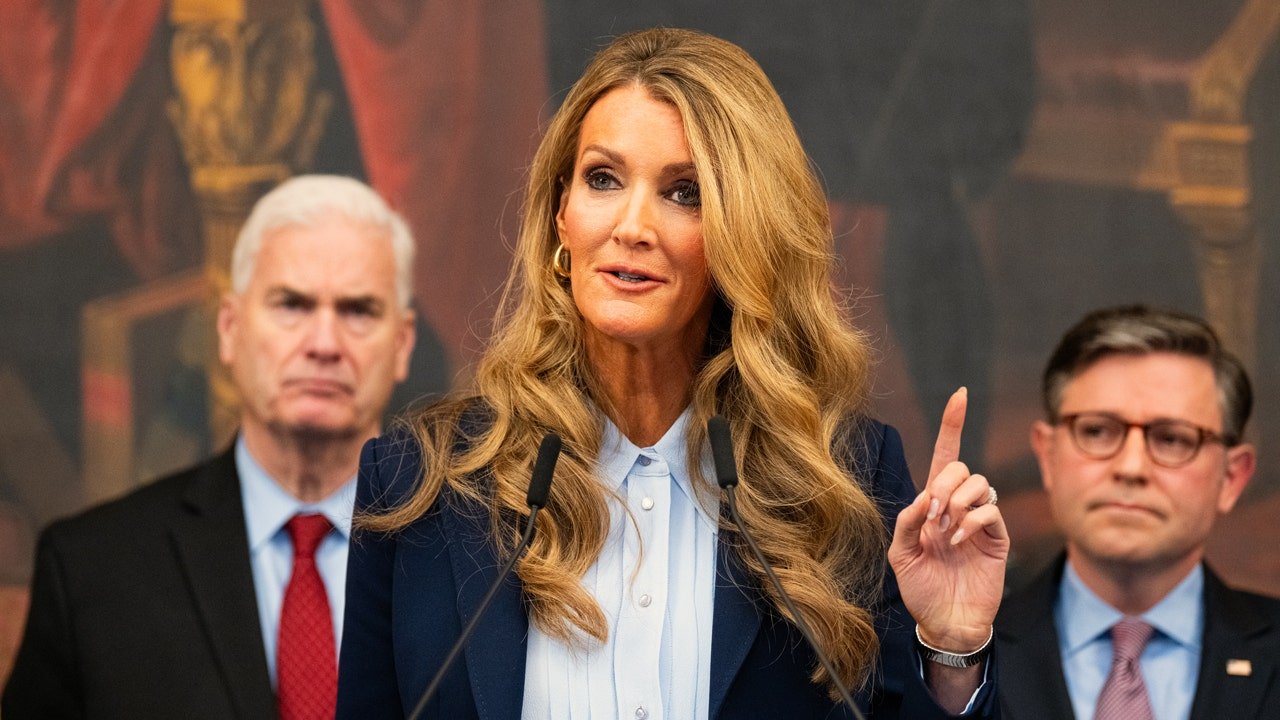
NEWYou can now listen to Fox News articles!
The federal Small Business Administration suspended more than 111,000 California borrowers after uncovering $8.6 billion in suspected fraudulent activity linked to the COVID pandemic, SBA Administrator Kelly Loeffler announced Friday.
«We have suspended nearly 112,000 borrowers tied to at least $9 billion in suspected fraud,» Loeffler said in a press release on Friday. «This staggering number represents the most significant crack-down on those who defrauded pandemic programs, and it illuminates the scale of corruption that the Biden Administration tolerated for years.»
The SBA reported that all in, it suspended 111,620 California borrowers who received 118,489 Paycheck Protection Program (PPP) and Economic Injury Disaster Loans (EIDL) loans, totaling $8.6 billion.
THE BORDER GETS THE ATTENTION WHILE FRAUDULENT GOVERNMENT BENEFITS BLEED TAXPAYERS DRY
The Small Business Administration announced the suspension of nearly 7,000 Minnesota borrowers after identifying hundreds of millions of dollars in suspected pandemic loan fraud. (Bill Clark/CQ-Roll Call, Inc via Getty Images)
PPP loans were a COVID-era federal relief program that gave small businesses money to keep workers on the payroll, while EIDL loans are part of an SBA program that provides low-interest disaster relief loans to help businesses survive during times of diaster, including the pandemic.
«Once again, the Trump SBA is taking decisive action to deliver accountability in a state whose unaccountable welfare policies have created a culture of fraud and abuse at the expense of law-abiding taxpayers and small business owners,» Loffler continued.
CHILDCARE EXPERT EXPOSES KEY ROADBLOCK TO UNCOVERING POTENTIAL FRAUD SCHEMES IN MINNESOTA: ‘REALLY DIFFICULT’
The announcement follows California Attorney General Rob Bonta saying on Thursday that the Trump administration was promoting «baseless claims» of persistent fraud in the state.

California Attorney General Rob Bonta dismissed Trump administration claims of widespread fraud. (Reuters/Fred Greaves/File Photo)
«Trump claims California is wasting money when, in reality, our programs are helping lower-income individuals and lower-income families get healthcare, food and housing assistance,» Bonta said on Thursday.
«Trump claims, wrongly, California is perpetuating fraud when we are the victim,» he added.
Bonta’s office noted that California has recovered nearly $2.7 billion in various fraud schemes across the last 10 years, «including by partnering with the federal government.»
EXCLUSIVE: SENATE BILL TARGETS MINNESOTA-STYLE ‘RUNAWAY FRAUD’ TO FORCE SCAMMERS REPAY TAXPAYERS
Fox News Digital reached out to Bonta’s office on Friday for additional comment.
Newsom’s office directed Fox News Digital to the Governor Newsom Press Office X account, which mocked the SBA announcement.
«OMG. The Trump Administration found MAJOR FRAUD in programs THEY control, Newsom’s Press Office’s X account posted, linking to a New York Post exclusive on the announcement.
«The state has no role running / administering these programs.Were they hiding this??? California doesn’t hide fraud … we fight it. Nearly 1,000 arrests + over $125 billion STOPPED under @CAGovernor Gavin Newsom.»

Quality Learning Center in Minnesota was found at the center of an alleged childcare fraud scandal in the state. (Madelin Fuerste / Fox News Channel)
Loeffler continued that the alleged California fraud comes after the SBA suspended 6,900 borrowers in Minnesota associated with 7,900 potentially fraudulent PPP and EIDL loans, which totaled roughly $400 million.
«As we did in Minnesota, we are actively working with federal law enforcement to identify the criminals who defrauded American taxpayers, hold them to account, and recoup the stolen funds. As we continue our state-by-state work, our message is clear: pandemic-era fraudsters will not get a pass under this Administration,» Loeffler said, comparing California to its investigations in Minnesota.
CLICK HERE TO DOWNLOAD THE FOX NEWS APP
Minnesota became ground zero for welfare and social services fraud surrounding the pandemic late in 2025, when investigators uncovered sweeping fraud schemes that could top $9 billion.
california,coronavirus,politics,donald trump,business regulation,minnesota fraud exposed
INTERNACIONAL
Shakira inauguró su residencia en El Salvador con un espectáculo de alto impacto y la “caminata de las lobas”

Entre banderas y luces, Shakira dio inicio a su residencia en San Salvador el sábado 7 de febrero de 2026 con un espectáculo marcado por la “caminata de las lobas”, una experiencia exclusiva junto a sus seguidores y creadores de contenido seleccionados a través de redes sociales.
El evento, que tuvo lugar en el estadio Jorge » Mágico» González, reunió a miles de fanáticos que esperaron desde las primeras horas de la tarde para acceder al show, donde las filas y los vestidos inspirados en la artista destacaron la expectativa y creatividad del público.
Desde las 16:00, las puertas permanecieron abiertas para recibir a los asistentes, quienes lucieron sus mejores versiones de “lobas” y homenajes visuales a “Las de la Intuición”. La jornada incluyó la selección de 53 cuentas ganadoras, elegidas mediante concursos en TikTok y otras redes sociales, que conformaron la denominada “manada” que acompañó a la cantante en la previa del show.
La apertura del concierto se caracterizó por el despliegue de tecnología de punta y una producción escénica que integró pantallas gigantes, juegos de luces y un cuerpo de bailarines.
En los posteos y transmisiones en vivo de los fanáticos en diversas plataformas, se observó que la artista apareció tras una secuencia de visuales, caminando entre la multitud para encontrarse con sus seguidores en el centro del escenario. El momento cobró fuerza con el inicio musical de “La Fuerte”, seguido de “Girl Like Me” y “Las de la Intuición”, lo que desató la euforia y los cánticos de los presentes.
La colombiana se convirtió en la primera artista en ofrecer cinco conciertos en El Salvador, consolidando así su presencia en la región y el impacto de su más reciente producción. El espectáculo mantuvo la atención de los asistentes gracias a una puesta en escena que combinó elementos visuales innovadores y la interacción directa de la intérprete con sus seguidores.
Cerca de las 9:30 p.m. (hora local), Shakira irrumpió en el escenario y recibió una ovación. “Hips Don’t Lie” marcó el inicio del show, con los fans coreando y capturando el momento.
La siguiente canción fue “Chantaje”, en la que Shakira introduce una versión con tintes de salsa. El público respondió con entusiasmo, siguiendo el ritmo renovado de este clásico.
Al finalizar la entrada, Shakira agradeció a su “manada ” y subrayó la importancia del reencuentro con sus seguidores y el amor que siente por el país.
“Diamantes en lugar de lágrimas”, definió la propia Shakira en alusión al brillo y la energía de la noche, frase que resaltó el tono festivo y la conexión emocional entre la artista y su audiencia.
El ciclo de conciertos en San Salvador continuará durante la próxima semana, en lo que promete ser uno de los hitos musicales del año para la región.
En esta nueva apuesta escénica, Shakira realizó arreglos en varias canciones de su set list, y ofreció versiones distintas que sorprenden a los asistentes y renuevan la experiencia de sus éxitos.
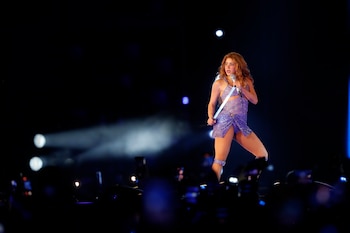
El espectáculo también se distinguió por un despliegue visual en el vestuario. Los atuendos de Shakira se caracterizaron por su espectacularidad y brillo, fusionando alta costura con elementos rockeros, andinos y urbanos. A su vez, destacaron diseños de Versace, cristales Swarovski, flecos, bodys ajustados, motivos de lobos y elementos metálicos que reflejaron empoderamiento y muestran la evolución artística de la cantante.

Entre los estilos clave, se observaron vestidos de gala, conjuntos de cuero, prendas con flecos y transparencias. Entre los diseños más icónicos de la noche, sobresalió el body de “Loba”, de inspiración cyberpunk, cubierto con cristales de Swarovski que simulan tatuajes tribales. El vestido “Lágrimas de Diamante”, diseñado por Zuhair Murad, llamó la atención con 50.000 cristales y espejos. Otro de los momentos destacados fue el minivestido rosa, confeccionado en malla con cristales y detalles de la Medusa de Versace.
El vestuario incluyó influencias de la cultura árabe, con monedas, cadenas y accesorios de Tiffany & Co. Entre los diseñadores presentes en el show estuvieron Natalia Fedner, Gaurav Gupta, Jawara Alleyne, Gunnar Deatherage y Dario Mittmann.
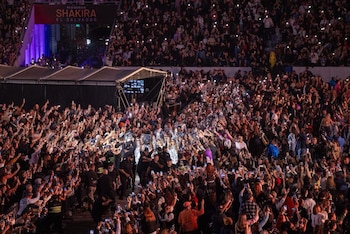
corresponsal:Desde San Salvador, El Salvador

 ECONOMIA2 días ago
ECONOMIA2 días ago¿La revancha de Don Chatarrín?: acuerdo Trump-Milei puede favorecer a Rocca ante el avance asiático

 CHIMENTOS3 días ago
CHIMENTOS3 días agoDesconcertada y sin la China Suárez: así reaccionó Magnolia tras el maltrato de un guardaespaldas

 INTERNACIONAL2 días ago
INTERNACIONAL2 días agoTop fiery moments as Democrats clash with Treasury Secretary Bessent in chaotic Hill hearings

